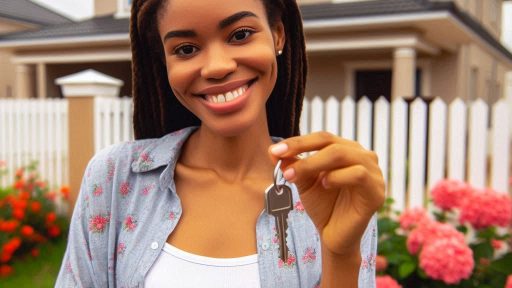Introduction
Buying your first home in Nigeria is a major milestone in one’s life.
It signifies stability, security, and a sense of accomplishment.
Importance of Home Ownership
Owning a home provides a sense of security, pride, and freedom.
It is a long-term investment that can appreciate over time.
Roadmap of the Ultimate Guide
In this ultimate guide, you will learn about the steps involved in buying your first home in Nigeria.
We will cover topics such as:
- Setting your budget and financial goals
- Researching the real estate market in Nigeria
- Choosing the right location and property type
- Securing financing and mortgage options
- Navigating the legal process of property acquisition
- Tips for maintaining and improving your home
Understanding the housing market in Nigeria
When diving into the housing market in Nigeria, there are several key factors to keep in mind:
Current State of the Housing Market in Nigeria
The housing market in Nigeria is experiencing a steady increase in demand due to population growth and urbanization.
Key Factors to Consider
- Location: Consider proximity to amenities, job opportunities, and security.
- Property Type: Decide between apartments, duplexes, or detached houses.
- Price Range: Set a budget based on your income and available financing options.
Tips for Researching the Housing Market
Here are some tips to help you make informed decisions when researching the housing market:
- Utilize online real estate platforms to compare prices and property features.
- Attend open houses and property viewings to get a feel for different neighborhoods.
- Consult with real estate agents who can provide expert advice on market trends.
- Consider the long-term potential for appreciation in value when selecting a property.
Setting Financial Goals and Budgeting
- It is essential to set clear financial goals before buying a home.
- Financial goals help determine the type of home you can afford.
- Setting a budget ensures you stay within your financial capabilities.
Importance of Setting Financial Goals
- Financial goals provide direction and purpose for your home purchase.
- They help you prioritize your spending and make wise financial decisions.
- Setting goals motivates you to save and invest wisely for your future.
Steps to Create a Realistic Budget
- Calculate your monthly income and expenses to determine your budget.
- Consider additional costs like property taxes, insurance, and maintenance.
- Factor in unexpected expenses and emergencies in your budget plan.
Advice on Saving for a Down Payment
- Allocate a portion of your income towards your down payment savings.
- Set up a separate savings account specifically for your home purchase.
- Look for ways to increase your income or reduce expenses to save more.
Managing Mortgage Payments
- Make sure to choose a mortgage rate and term that fits your budget.
- Consider making extra payments to reduce the length and cost of your mortgage.
- Monitor your expenses to ensure you can comfortably afford your mortgage payments.
Read: Demystifying Real Estate Investment in Nigeria: A How-to
Exploring Different Financing Options
When it comes to owning your first home in Nigeria, one of the most crucial aspects to consider is how to finance your purchase.
There are various financing options available for first-time homebuyers in Nigeria, each with its own set of pros and cons.
In this section, we will compare and explain the different financing options, such as mortgages, home loans, and government housing schemes, to help you make an informed decision based on your individual circumstances.
Mortgages
Pros
- Allows you to own a home without paying the full purchase price upfront.
- Fixed interest rates provide predictability in monthly payments.
- Longer repayment periods make it more affordable for many buyers.
Cons
- Strict qualification requirements may exclude some potential buyers.
- Interest rates can fluctuate, leading to higher monthly payments.
- Defaulting on a mortgage can result in the loss of your home.
Home Loans
Pros
- Flexible repayment terms tailored to your financial situation.
- Can be obtained from both traditional financial institutions and non-banking lenders.
- May have lower interest rates compared to mortgages.
Cons
- May require a higher down payment compared to other financing options.
- Some lenders may have strict eligibility criteria.
- Defaulting on a home loan can negatively impact your credit score.
Government Housing Schemes
Pros
- Lower interest rates compared to traditional lenders.
- May offer subsidies or assistance programs for first-time homebuyers.
- Less stringent eligibility criteria compared to other options.
Cons
- Limited availability as these programs are often oversubscribed.
- May involve a longer application and approval process.
- Restrictions on the type of property you can purchase.
Choosing the Best Financing Option
When deciding on the best financing option for your first home purchase in Nigeria, it is essential to consider your financial situation, future plans, and risk tolerance.
Here are some key factors to keep in mind:
- Evaluate your ability to make monthly payments consistently.
- Consider the total cost of the loan, including interest and fees.
- Compare interest rates and repayment terms offered by different lenders.
- Assess your eligibility for government housing schemes and subsidies.
- Seek advice from financial experts or real estate professionals.
Ultimately, the best financing option will depend on your individual circumstances and long-term goals.
By carefully weighing the pros and cons of each option and seeking professional guidance, you can make an informed decision that puts you on the path to owning your first home in Nigeria.
Read: Securing Your Dream Home in Nigeria: A Financial Plan
Working with Real Estate Agents and Developers
Role of Real Estate Agents and Developers
- Real estate agents help you find properties that meet your needs and budget.
- Developers build and sell properties, offering new constructions or renovated homes.
- They guide you through the buying process, from property search to closing the deal.
Tips on Finding Reputable Agents and Developers
- Ask for recommendations from friends, family, or colleagues who have recently purchased a home.
- Check online reviews and ratings of agents and developers in your area.
- Interview multiple agents to find someone who understands your needs and preferences.
- Look for agents and developers who are licensed and affiliated with reputable organizations.
Importance of Conducting Thorough Due Diligence
- Research the background and track record of agents and developers before committing.
- Verify their credentials, licenses, and certifications to ensure they are legitimate.
- Check for any complaints or negative feedback from previous clients or regulatory agencies.
- Visit properties built or sold by the developer to assess quality and craftsmanship.
Read: Nigeria’s Housing Market: An In-depth Analysis

Navigating legal and documentation processes
When purchasing your first home in Nigeria, it is crucial to navigate the legal and documentation processes effectively to avoid any potential issues in the future.
Understanding the legalities involved in the property purchase will help you make informed decisions and protect your investment.
The legalities involved in purchasing a home in Nigeria
- Start by conducting thorough research on the laws governing property ownership in Nigeria.
- Consult with a real estate lawyer to guide you through the legal requirements.
- Understand the different types of property ownership structures in Nigeria, such as leasehold and freehold.
- Ensure that the property you are purchasing has a valid Certificate of Occupancy (C of O) or Governor’s Consent.
- Verify that the property is not subject to any legal disputes or encumbrances.
Key documents required for property transactions such as title deeds, survey plans, and building approvals
- Title Deeds: These documents prove ownership of the property and should be verified for authenticity.
- Survey Plans: These documents show the boundaries and layout of the land, ensuring that there are no boundary disputes.
- Building Approvals: These documents confirm that the property has been built according to approved plans and specifications.
- Receipts of payment for the property transaction should also be kept as proof of purchase.
- Other documents may include power of attorney, deed of assignment, and tax clearance certificates.
Guidance on how to verify the authenticity of documents and avoid common pitfalls
- Consult with professionals such as real estate lawyers, surveyors, and valuers to review the documents.
- Compare the information on the documents with physical inspections of the property to ensure alignment.
- Verify the authenticity of the documents with relevant government agencies and registries.
- Avoid purchasing properties with incomplete or suspicious documentation to prevent legal complications.
- Perform due diligence before finalizing the transaction to safeguard your interests and investment.
Read: Tax Implications for Nigerian Home Owners: A Comprehensive View
Home inspection and negotiation
When it comes to buying your first home in Nigeria, one of the most crucial steps is the home inspection and negotiation process.
This is where you have the opportunity to thoroughly examine the property, identify any potential issues, and negotiate the price and terms of the sale to ensure you are getting the best deal possible.
Your Personalized Financial Plan
Get expert financial advice tailored exclusively to your goals. Receive a custom roadmap in just 1-3 business days.
Get StartedImportance of Home Inspection
Conducting a thorough home inspection before finalizing the purchase is essential for several reasons:
- Identify any potential structural or mechanical issues
- Ensure the property meets all safety and building code requirements
- Estimate any potential repair or maintenance costs
- Verify that all systems and appliances are in working condition
- Avoid unexpected surprises or expenses after moving in
Checklist for Home Inspections
When conducting a home inspection, be sure to look out for the following key things:
- Roof condition and age
- Plumbing and electrical systems
- Foundation and structural integrity
- Heating and cooling systems
- Appliances and fixtures
- Windows and doors
- Drainage and insulation
Tips for Negotiating
Negotiating the price and terms of the sale can make a significant impact on the overall cost of your new home.
Here are some tips to help you get the best deal possible:
- Research comparable properties in the area to determine a fair market value
- Identify any issues uncovered during the home inspection to use as leverage
- Consider asking for repairs or a credit towards closing costs
- Be prepared to walk away if the seller is not willing to negotiate
- Work with a trusted real estate agent or lawyer to help guide you through the negotiation process
By following these guidelines and being diligent in your home inspection and negotiation efforts, you can ensure that you are making a well-informed decision and securing the best possible deal on your first home in Nigeria.
Conclusion
Owning your first home in Nigeria is a significant milestone that requires careful planning and consideration.
Key Points Summarized
- Research the real estate market
- Determine your budget and financing options
- Consider location, amenities, and potential for growth
- Inspect the property thoroughly before purchase
- Hire a reputable real estate agent or lawyer for guidance
Take Action Towards Homeownership
Now that you have the ultimate guide to owning your first home in Nigeria, it’s time to take action.
Start by setting realistic goals, creating a savings plan, and exploring different properties in your desired location.
Remember that homeownership is a long-term commitment that requires dedication and financial discipline.
Additional Resources
For further reading and assistance on owning your first home in Nigeria, consider the following resources:
- Nigerian Mortgage Refinance Company (NMRC)
- Federal Mortgage Bank of Nigeria (FMBN)
- Real estate websites like PropertyPro.ng and Jumia House
- Real estate seminars and workshops in your area
By utilizing these resources and staying informed, you can make your dream of owning a home in Nigeria a reality.
Good luck on your journey to homeownership!




